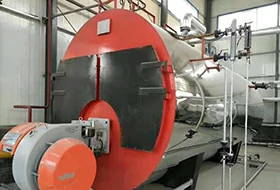
Dec . 11, 2024 03:30 Back to list
Design Considerations for Efficient Hot Water Boiler Systems in Modern Applications
Designing a Hot Water Boiler Key Considerations and Principles
Hot water boilers are a crucial component in heating systems for residential, commercial, and industrial applications. The design of a hot water boiler involves several critical considerations to ensure efficiency, safety, and longevity of the system. This article provides an overview of the key aspects of hot water boiler design.
1. Understanding Boiler Types
There are different types of hot water boilers available, including fire-tube boilers, water-tube boilers, and electric boilers. Fire-tube boilers are characterized by hot gases passing through tubes surrounded by water, making them prominent for low-pressure applications. In contrast, water-tube boilers circulate water through tubes heated by external flames, offering higher pressure and temperature capabilities.
Choosing the right type of boiler depends on the intended application, production capacity, and specific environmental conditions. For instance, industrial facilities may require high-capacity systems capable of handling extreme pressure and temperature, while residential applications often utilize smaller, less complex systems.
2. Efficiency and Energy Consumption
One of the primary considerations in boiler design is energy efficiency. Modern boilers are designed to maximize heat transfer and minimize heat loss. Key factors include proper insulation of the boiler body, utilizing advanced combustion technology, and incorporating economizers to reclaim heat from exhaust gases.
The efficiency of a boiler is often measured by its Annual Fuel Utilization Efficiency (AFUE) rating. A higher AFUE indicates a more efficient boiler, which translates to lower energy costs and a reduced environmental footprint. Designers should strive to achieve the highest possible efficiency to comply with tightening regulations and growing sustainability demands.
Proper sizing of the boiler is critical to ensure optimal performance. A boiler that is too small will struggle to meet heating demands, while an oversized boiler can lead to inefficiency and increased wear and tear due to short cycling.
hot water boiler design

To size a boiler accurately, engineers consider factors such as the space heating load, hot water demand, and the local climate. Tools like heat loss calculations help determine the necessary capacity. It is essential to engage in detailed assessments to avoid oversizing or undersizing the system.
4. Safety Features
Safety is paramount in boiler design. Boilers operate under high pressure and temperature, which can lead to hazardous situations if not properly managed. Key safety features include pressure relief valves, automatic shut-off systems, and adequate ventilation to prevent gas buildup.
Moreover, adherence to industry standards and regulations, such as those set by the American Society of Mechanical Engineers (ASME) and other relevant bodies, is crucial. Regular maintenance and inspections should also be part of the operational protocol to enhance safety and performance.
5. Water Quality Control
The quality of water used in the boiler can significantly impact its performance and lifespan. Hard water, for instance, can lead to scale formation within the boiler, reducing efficiency and potentially causing damage.
Incorporating water treatment systems into the boiler design helps manage water quality. Softening agents and chemical treatments can mitigate issues related to scale, corrosion, and fouling. Continuous monitoring and treatment of the water supply ensure the boiler operates efficiently and has an extended service life.
Conclusion
The design of a hot water boiler encompasses a range of critical considerations, from selecting the appropriate type and ensuring energy efficiency to incorporating essential safety features and maintaining water quality. By adequately addressing these elements, designers and engineers can create robust and efficient hot water boiler systems that meet the diverse heating needs of modern applications. A well-designed boiler not only enhances comfort and operational efficiency but also minimizes environmental impact, contributing to a sustainable future.
-
High-Efficiency Commercial Oil Fired Steam Boiler for Industry
NewsJul.30,2025
-
High-Efficiency Biomass Fired Thermal Oil Boiler Solutions
NewsJul.30,2025
-
High Efficiency Gas Fired Thermal Oil Boiler for Industrial Heating
NewsJul.29,2025
-
High-Efficiency Gas Fired Hot Water Boiler for Sale – Reliable & Affordable
NewsJul.29,2025
-
High Efficiency Biomass Fired Hot Water Boiler for Industrial and Commercial Use
NewsJul.29,2025
-
High-Efficiency Biomass Fired Hot Water Boiler for Industrial Use
NewsJul.28,2025
Related PRODUCTS






















